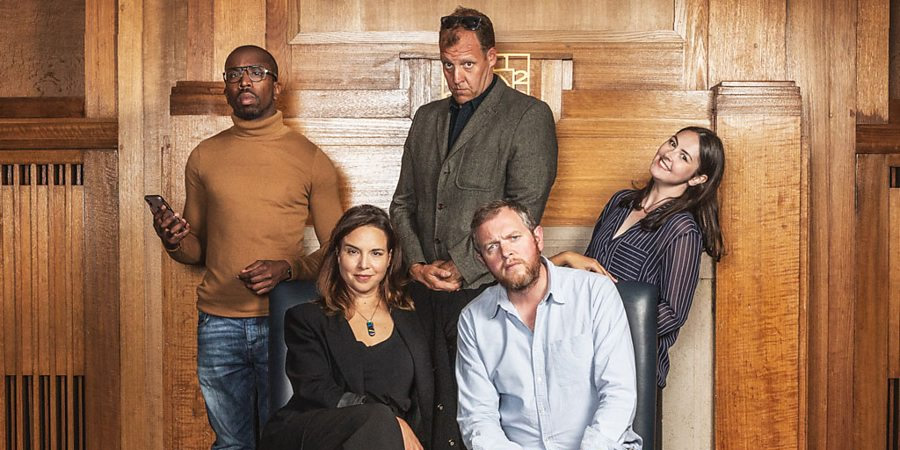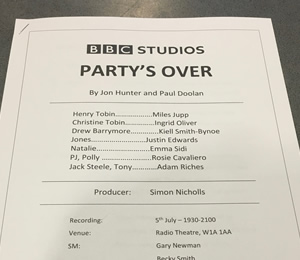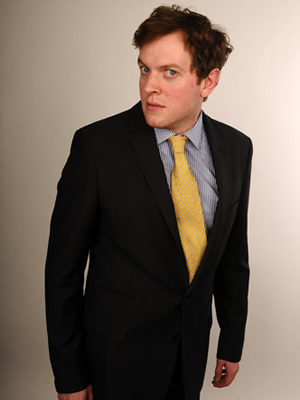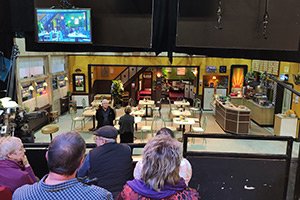Paul Doolan and Jon Hunter interview

Paul Doolan and Jon Hunter have written the new Radio 4 sitcom Party's Over together. The show stars Miles Jupp as a prime minister turfed out of office after a crushing election loss, and follows the character as he tries to work out what to do next. We asked Paul and Jon to talk in-depth to us on the topic of comedy writing...
You've both been writing comedy for a long time now. How did you get started?
Paul: I started by getting a job in TV as a runner at Talkback Thames who, at the time, were making the sketch show Man Stroke Woman. I tentatively asked if I could submit some sketches, and managed to get quite a few in the show. It was exec produced by Ash Atalla who then left Talkback to set up his own production company, Roughcut, and I went with him, first as his assistant and then moved up in to development. I was still keen to continue writing so eventually dropped down to 4, then 3, days a week to use my free days for writing until, eventually, a sitcom I co-created there, Trollied, was commissioned and I was able to quit the day job and write full time.
Jon: I started off by sending sketches to an open door radio show (back then it was Bearded Ladies on Radio 4) while also sending some sample sketches to a couple more radio producers who'd made things I liked. Off the back of that, I got asked to submit to a couple more shows. Those went well enough that I got recommended to other producers in the radio comedy department and did trials for both The News Quiz and The Now Show. After writing for both of those and a few other shows (mainly radio, but a bit of TV and a few online things) on and off for a year or so - all while I was working during the day as a stage door receptionist in a theatre, similarly to Paul dropping down from 5 days a week to 4 etc until I was only doing 1 day - I got offered a place on the BBC Radio Comedy Bursary (on my second try) and suddenly I was writing full time and never had a steady paycheck or job security again...
Where did the premise for Party's Over come from? It's obviously become super-topical this week - was it always the plan to tie it in with Theresa May's exit?
We never really intended for the show to feel specifically topical but prime ministers have started to drop at such a rate that we seem to be topical every 6 months.
In truth, it was the situation that interested us and felt like a rich area for comedy. Ex-PMs are such an interesting group, all of them forced out in what would in any other profession be the prime of their career, full of bitterness and having to figure out what the hell they do next. So many of them move straight into the corporate world to make a tonne of money, so we wondered what would happen to one who had all of those options closed off to them.

How did you come to team up to write Party's Over?
Paul: Party's Over was a show I'd initially developed on my own. But when Simon Nicholls (the producer) pitched it to Radio 4, they commissioned a script with a tight deadline at a time when I was so busy with other projects there was no way I could do it. Jon was the natural fit to come on and take over as we'd worked together a lot in the past, have the same sensibilities when it comes to comedy and, crucially, he'd worked a lot in radio so knew his way around writing for that medium.
Jon: Paul and I had already been writing together for a while - in amongst writing on our own and with other people - we'd developed a handful of sitcoms and comedy dramas over the years and I'd written for a series of Trollied - so it felt natural to take over writing Party's Over for him. Plus he'd already done the hard work - creating the characters and working out the basic plot so I mainly just had the dialogue to do.
That script got submitted to Radio 4's comedy commissioner Sioned Wiliam who liked it and asked for a pilot episode. But, because it wasn't going to be recorded and broadcast until almost a year later, when the time came around we figured politics and news had moved on too much since that original draft (we'd had a whole other prime minister come and go in the meantime) and it now felt massively dated - so we decided to write a new pilot script from scratch instead.
This time we worked together - changing the characters, adding a couple of new ones and then working up a brand new plot around them. Then, once we knew we had Miles onboard we tweaked the character of Henry to suit him even more and got writing pretty quickly.
So how does the dynamic work between the two of you?
We don't actually spend a lot of time in the same room when we write - due to geography rather than any legal orders - but always meet up a few times at the start of a new project to do the initial planning in person. After that we tend to work a lot on Skype/phone while we carry on planning and fleshing out the initial idea into a scene breakdown - then one of us will start the script and we'll pass it back and forth (or at least 'save it in Dropbox') adding, editing and rewriting as we go until we have a first draft. Then we'll talk it through, make notes for the next rewrite and then start passing it back and forth again until the next draft is done - usually one of us will take the morning and the other the afternoon - each working on other stuff in the meantime.
While we're drafting and redrafting - if one of us thinks they need to make a change that feels a bit more drastic (changing the plot or having Miles' character assassinated in the opening scene - spoilers for a potential episode 2...) we'll call the other one to check they're ok with it. We never make big changes unless we both agree on it.

We love all the characters. How long did you spend on the 'world building' stage, before getting into the meat of the plot?
We spend a lot of time on the initial planning stage - it's the most important part. The plots and stories can only really come when the characters are right, as they have to be intrinsically linked. We had a few false starts where one or more characters just weren't working so we worked on these, getting them up to a level where they felt like they could generate stories and jokes on their own before starting on the script.
Plus, we've always found that the more planning work goes in at the start, the less drastic the rewrites are further down the line so, as lazy men, it just makes sense to us to work this way.
It's a gag packed show! Can you talk to us about juggling plot and jokes?
We definitely think character first - then plot/story and only really start concentrating on jokes when that's sorted. In theory - if the characters are right the jokes should come relatively easy - then we carry on tweaking, adding and improving jokes all the way until recording.
It sounds ridiculous for a comedy but jokes are the last thing we think about. If the world you've built is interesting enough and the mix of characters is one with funny dynamics and tensions then the jokes will come easily. So much of the first draft and subsequent rewrites is about finding story and character clarity, making sure everything feels clear, believable for the world of the show and each plot has a clear, interesting cause and effect. Then, when these are all working, you start to get a sense of where in the script jokes are needed but it's really at most 10% of the work.
The best jokes are usually very specific to the characters - even to the specific delivery of that character - so even if we're happy with the script, jokes will change again once the actors come in and we hear how they're playing the roles.
It was recorded in front of a live audience. It's too late by that point to change a line if it doesn't land, so were you nervous watching the recording?
Paul: Having mainly worked in single camera television, there's usually a delay of several months between finishing a script and seeing the finished product. Crucially, you're also not made to sit in a room with the audience and find out in real time whether they think the show is funny, so that side was nerve-wracking. Watching the recording was also a huge amount of fun for the same reasons though. In a job that largely involves sitting alone in a room, it's nice to be allowed out and hear a room full of people enjoying your work.
Jon: We were really, really happy with the cast. We knew they were all good comedy performers but with a radio show the actors don't actually get to read the script out loud until the day of recording. So we didn't know exactly how everyone would sound until then. After that, the initial nerves vanished as we knew we were in safe hands.
I've done a lot more radio than Paul over the years and I've been to so many recordings for things I've written on or script edited that I wasn't really expecting to feel any nerves on the night. But I quickly learned it's definitely still nerve-wracking when it's your own thing and you don't know if the audience will get on board until that first laugh. Once that happened and we knew we weren't going to have to hide from an angry Radio Theatre crowd we both relaxed and managed to enjoy it all.
Any general sitcom writing tips you could offer BCG Pro readers?
As we've mentioned a lot already - character is the most important thing. Both individually and how they relate to each other. It doesn't really matter where a sitcom is set - and though many are highly dependent on a premise - they'd be nothing without the right characters at the heart of them.
Also, pick a situation and characters that you'd be happy to spend several series with. So many writers starting out tend to write what they think people want rather than a show they would like to see or hear. Party's Over really came about by having a nub of an idea that we were excited to explore which meant we didn't hit a wall of boredom at any point. It's no coincidence that when you're working on an idea you're genuinely excited about, stories and jokes flow so much more naturally.
This is a pilot episode, but presumably you'd be up for making more?
We're definitely up for making more - particularly now we've got this amazing cast to write for. When we were first chatting about the pilot we came up with lots of general story ideas to make sure there was enough in the characters and premise to sustain and not crumble after the first episode - but now we know the characters even better we're itching to work on some new ideas for them.
Plus, the country's about to throw itself off a cliff - so it would be good to have the work!
Party's Over is on Radio 4 on Friday at 11:30am.
This article is provided for free as part of BCG Pro.
Subscribe now for exclusive features, insight, learning materials, opportunities and other tools for the British comedy industry.


